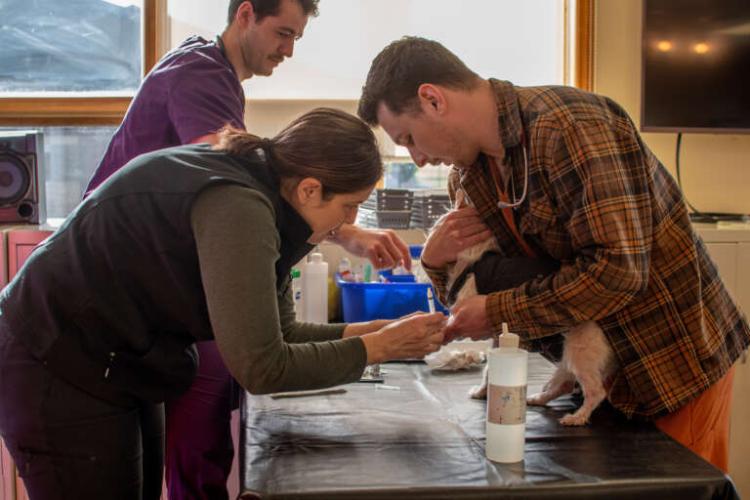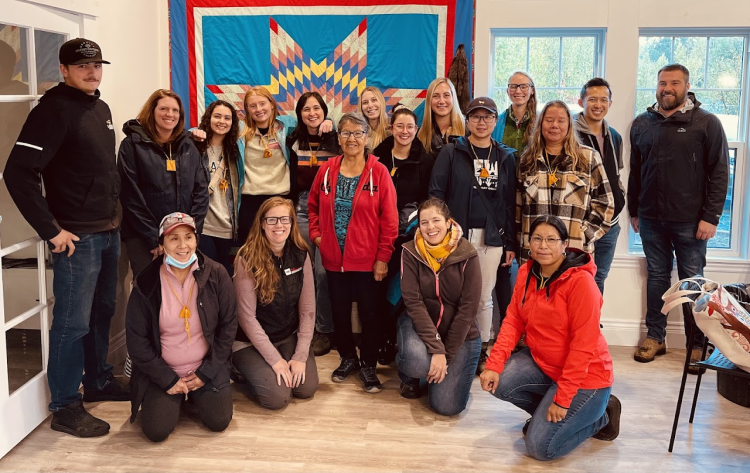Kim and Stu Lang have generously added $7 million in renewed funding through The Angel Gabriel Foundation to support the Kim and Stu Lang Community Healthcare Partnership Program (CHPP) and Remy's Fund at the Ontario Veterinary College (OVC).
Working with partner communities and organizations, the purpose of CHPP is to create opportunities for student veterinarians to learn to lead and support programs that expand access to animal health care for underserved populations. A further research component has been included to inform best practices and policy, promoting a One Health approach to the provision of health services for vulnerable animals and those who care for them.
In November 2019, the couple launched these initiatives with the largest grant OVC has ever received $11 million. Five years later, they have elected to build upon and safeguard the program's future success.
"Through their signature program, Kim and Stu Lang have enabled OVC to embed principles of social justice, shelter and community medicine into our Doctor of Veterinary Medicine program," said Dr. Jeff Wichtel, OVC dean. "This has been nothing short of groundbreaking in Canada, and we are eternally grateful to the Langs for underwriting our vision for change in the veterinary profession."
Care for pets in underserved communities

CHPP Director Dr. Lynn Henderson cares for an animal
The additional $7 million from the Langs will secure the necessary human resources, including graduate students, and fund operational needs to meet the growing demand for CHPP mobile clinics over the next five years.
Two million of the $7 million total were designated for Remy's Fund, named for the Langs' beloved Yellow Lab. Remy's Fund is accessed when CHPP patients' illness or injury cannot be treated within the time or other constraints of a mobile clinic. Demand for this assistance has seen a similar rise with the growth of the program and the expanding network of partner clinics willing to do this work.
In making the grant, Kim Lang said, "We're delighted with all that CHPP has done to bring us closer to the day when every family who has an animal in Canada has access to basic health care because so many more veterinarians embrace the opportunity to serve these communities."
CHPP's Veterinary Director Dr. Lynn Henderson, who narrates the latest video describing CHPP, explained that while we provide service to a growing number of clients, "The big difference for us is we've built the whole program to teach students how to do this work."
Henderson continued, "If you're going to make meaningful change, you need to figure out how to grow a network of people that want to speak this language and do this work."
Improving health care access for all animals

Remy
The initial goals of CHPP were to improve access to basic health care for all animals, to help resolve social inequities, build stronger, more integrated communities and contribute to reconciliation with Indigenous Peoples across Canada. Those goals could not be achieved "off the corner of someone's desk."
Prior to the creation of CHPP, Dr. Shane Bateman supervised groups of veterinary student volunteers as they fundraised for and delivered community-based veterinary services. "Taking students into these communities and watching them learn in these moments Those were incredibly powerful experiences," said Bateman.
Bateman had the idea to formalize these transformational volunteer experiences through incorporation into OVC's Doctor of Veterinary Medicine (DVM) curriculum. He shared his vision to teach about access-to-care with Wichtel shortly after he arrived as the new dean of OVC in 2015. While in full agreement, it was clear to Wichtel that integrating community medicine would not be feasible without transformational funding.
OVC needed to hire additional veterinary staff who could both teach and deliver community-based no-or-low-cost veterinary clinics and experiential rotations for the students. This necessitated staff with the skills to develop partnerships with social service agencies, community health teams, and animal sheltering organizations.
Veterinary graduates with focus on accessible care

CHPP members with Sagamok Anishnawbek community members
Further, this program would require a significant shift in the DVM program to produce veterinary graduates with the confidence and cultural humility to do this work effectively. At the time, there was no one at OVC who was engaged in animal welfare research in the broader social justice context. With the 2019 historic grant, the Kim and Stu Lang Professor in Community and Shelter Medicine was established.
Social scientist Dr. Lauren Van Patter was hired to ensure continuous improvement in culturally appropriate service, understand and devise strategies to overcome barriers to care, and examine the long-term benefits to students and communities of incorporating these principles into the DVM curriculum.
"Our research team is conducting surveys, focus groups and interviews to understand career impacts over time," said Van Patter. "We're asking questions to inform and refine the curriculum and evaluate whether this approach creates lasting change in the manner our graduates practice veterinary medicine in the future."












